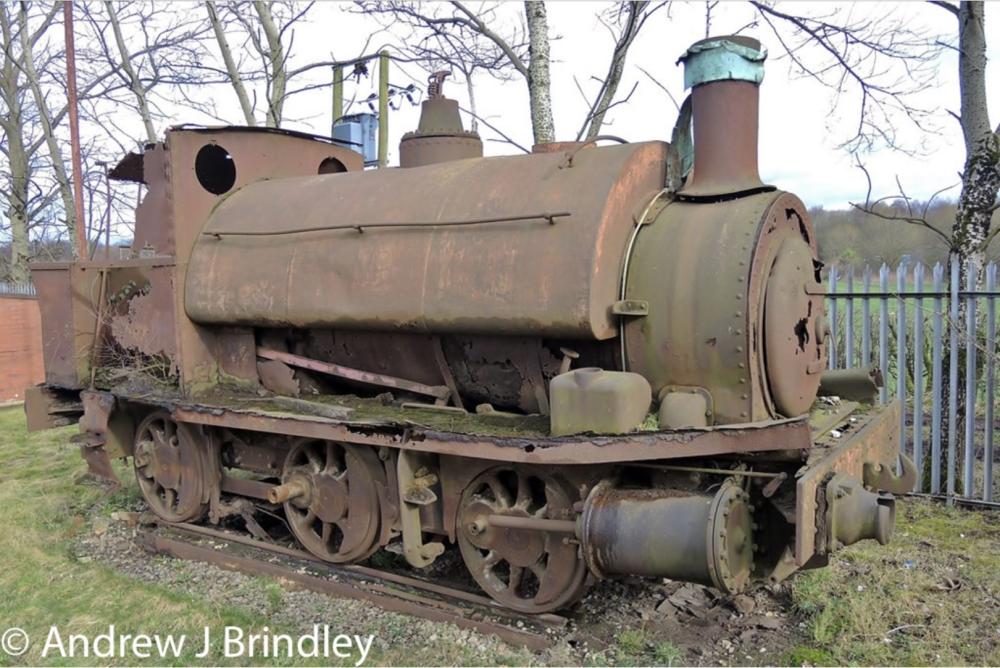Wigan Album
Garswood Hall Colliery
16 Comments
Photo: . Ozy .
Item #: 35698
So sad to see an old work horse in that state, it must have given years of service & now lies forgotten.
I agree Helen....that is one of the saddest photos I have ever seen. The fact that is has a name, "Robert", makes it almost like a human being put on the scrap heap. It just looks defeated.
That's really sad to see Ozy, almost nothing left of the steel with corrosion eating it away. The conrods are missing from the wheels too.
Helen is correct, an engine that's work it's long life of very many years service literally thrown on the Scrapheap and seems to be forgotten.
Rest in piece Robert.
Robert will be weighed in and then melted down, its the same fate all will face one day, RIP Robert
But the good thing about Robert is he will come in another form, maybe a shopping trolley or a hinge on a shed door
Thank for that respectable comment Mick.
Considering the fact that this loco was delivered new in 1912 and scrapped in 1965 , which was pretty much at the end of the steam era anyway , I’m thinking 50 odd years wasn’t a bad innings for the old lad especially when locomotives that were only a few years old were being gas axed at Ince and Barry , to name just a couple of places, at about the same time .
Many were saved for preservation , many others weren’t .
Robert was one of the unlucky ones .
I’m guessing he was sent to Howfen from the N.C.B maintenance facility at Walkden as he was too far gone for anything other than scrapping , but that’s only my guess .
After 53 years , the poor owd lad would have been a bit like Trigger’s brush anyway I reckon .
Still , I know a bit more about Robert than I did yesterday , and that’s what counts .
Some of these saddle tank engines lasted much longer than the end of steam for BR in 1968. They worked for many years later for NCB up and down the network. They were ideally suited because of their size and power for a small engine. They were also useful for going round curves and could work as good in reverse as going forward.
The two engines at Bickershaw were in full use up to the end of the 1980s.
That's when Thatcher killed off the pits.
That’s not the only thing that Thatcher killed off either Jason , but best not to go there eh ?
I guess you're all guessing because of what somebody said. Where's the proof that loco was named Robert?
Going of at a slight tangent, for which I do beg your pardon, but I have read, in more than one place, that Garswood Hall Collieries had a steam locomotive which they themselves had built.
This is quite feasible, as Evans, nearby in Haydock also did the same, building six locomotives.
Details of Garswood Hall's build seem to be hard to find. So I thought maybe worth asking on here, just in case anyone has any information.
A famous Robert built his own steam engine at Haigh in 1812: "Robert Daglish, was a prominent local engineer and the first to use a steam engine in Wigan. He obtained the design and patent from John Blenkinsop in Leeds and built the engine at Haigh in 1812. It was then put to work on the Orrell coalfield in 1813."
From Here:
https://engole.info/the-walking-horse-locomotive/
He was the father of Dr George Daglish Honorary Surgeon at the Wigan Dispensary on King Street, the forerunner to Wigan Royal Albert Edward Infirmary. See the essay by (Dr) Chris Heaven on this link:
https://oldrailwaystuff.com/wigan-dispensary/
Yet another "Robert" -
https://www.sthelensstar.co.uk/resources/images/16167968.jpg?type=mds-article-620
With this being about coal this is worthy of a mention, over on Communicate Peter P has commented about an event that happened on this day 46 years ago at Golborne Colliery, where an explosion of gas build up claimed the lives of ten miners, and left one seriously injured.
I do remember that and thought it tragic that even with all the modern mining safety procedures, an explosion of methane gas still happened, though in the link below it explains why the build up of gas happened, it was very sad news.
https://lowtonandgolbornenews.co.uk/remembering-the-golborne-colliery-disaster/#:~:text=On%2018%20March%2C%201979%2C%20a%20disaster%20occurred%20at,the%20tunnels%20caused%20a%20devastating%20explosion%201%2C800ft%20underground.
Robert was at Garswood Hall until early 62 when it moved to Lea Green pit in St Helens. It then moved to Cronton Colliery in Feb 64. In 1965, it was sold for scrap to Jose K Holt & Gordon at Chowbent but they didn't scrap it. Eventually, it moved to John Marrow's works in Blackrod and is still there as far as I know. Built in Bristol by Avonside Engine Co.
Many thanks Ted .
At the time of the Golborne explosion, I was working for a Manchester hospital.
It was the time when the 'Area' tier of management was abolished: employees of area health authorities had been redeployed to Regional Health Authorities, and to District Health Authorities.
It was also the time when a fire had destroyed all the dried milk and blankets kept in Manchester's Emergency strategic reserve to cope with civil catastrophe.
At this time, I had been one of the clinicians representing our hospital on the Emergency Planning Committee.
At the meeting following the fire, one of the doctors who had joined us from a prior position in the now defunct AHA, told us to forget about milk and blankets. that the entire resources of THREE Manchester district health authorities had been insufficient to cope with three major burns cases resulting from the Golborne Colliery explosion!
The implication being that any response to a cold war nuclear incident, was completely hypothetical, and the loss of milk and blankets mattered not!